- Home
- Alice Hoffman
Magic Lessons Page 19
Magic Lessons Read online
Page 19
* * *
Maria Owens sat in jail, knowing her fate. She saw the hanging to come in the palm of her left hand, the fortune she’d made by coming to Salem. When Lydia Colson brought her supper, Maria was unable to eat. Not because the bread was hard and the stew cold, but because all she could think about was her daughter.
“I found her for you,” Lydia whispered. She had her granddaughter stand guard to ensure the constable wouldn’t overhear.
Maria looked at her blankly.
“I went to Martha Chase. I’ve told her you’ve asked to see the child.” Maria was overcome with gratitude, but Lydia shook her head, for the visit hadn’t gone well. “She refused. A jail is no place for a child, she said, and I had no business doing your bidding. She looked at me in a way that frightened me, as if she suspected me of some foul deed, when all I did was bring a message to her. And what of you, she said to me, right in front of my Elizabeth, are you certain the devil himself hasn’t sent you here?”
Faith was kept inside the house during this conversation, but afterward Lydia had spied the child looking out the window before a hand drew her away.
“Go back,” Maria pleaded. “Ask again if she’ll bring my girl here. I’ll pay any price!”
“I dare not go. That woman said she would report me as your accomplice if I returned. She would write to the magistrates if she had to, as she did to call their attention to you.”
That was how Maria learned that Martha had implicated her for her own satisfaction. She’d been a fool to trust her, that simple woman who cherished her neighbors and her town. Some people can lie while they look at you and manage to hide their falseness; it’s a form of witchery to be so disloyal, a terrible talent that is both rare and despicable. “Surely they won’t believe her lies. They’ll see she’s stolen my daughter.”
“You’re a stranger here,” Lydia said. “I’ve lived here all my life and I know that people see what they wish to believe.”
“We’re all strangers if they should decide for us to be so,” Maria responded. “They can turn on anyone if it benefits them.” She then asked if Lydia would keep an eye on Faith, from a distance if necessary, to make certain she wasn’t being mistreated. “I would do the same for you if you needed me. Someday I’ll pay you what I owe you.”
Though the child was only eight, Elizabeth Colson vowed she would try to watch over Faith, and because of this her grandmother relented and said she, too, would try to see to the girl’s well-being as best she could.
That night, Maria dreamed of her daughter, for although iron cuffs did away with the sight, they couldn’t prevent dreams. In Martha Chase’s house, where the raspberry bushes hit against the windows, and rabbits gathered in the yard, Faith Owens dreamed the same dream. She heard her mother tell her that when you were loved by someone, you never lost them, no matter what might happen next. Despite the curse, despite the losses you might endure, she knew now that love was the only thing that lasted. It was inside you and with you for all eternity.
* * *
The day drew near. It was spring and the world was green, but in jail the earthen floor and walls were cold. Maria heard the beetle calling, the same one Hannah had searched for in her cottage, the warning sign of a death to come. Maria covered her ears with her hands, yet heard it still. She closed her eyes and tried to dream even in the daylight hours, for it was her only escape from this dank and terrible place. In her dream snow was falling, with huge flakes dashing against her cheeks and eyelashes. When she opened her eyes and gazed out the window, there appeared to be white flakes, though the morning was warm and fine.
Maria went to the window and reached her hands through the bars as far as her cuffs would allow, so she might collect the snow and let it melt and drink what was left. It was then she discovered it wasn’t snow that fell, but large creamy petals. She wondered how this had come to be, and if indeed it was a miracle. And then she saw a face she recognized, and dark eyes staring at her. The man who couldn’t stop talking had come to Essex County to bring her a flowering tree belonging to an ancient genus, twenty million years old, existing before there were bees, so that it was pollinated by beetles. This one had come all the way from the Martinique, where people referred to it as a tulip tree or a sweet bay. It was said that the original flowers on earth were much like those on this tree, with white leathery petals and tough waxy leaves, impervious to the work of beetles or ants.
On the island the Carib people called Madinina, “Island of Flowers,” Samuel Dias had met a man who told him of a sort of tree people swore could make a woman fall in love if she stood beneath its boughs. Perhaps, if he brought Maria Owens this tree, it would open her heart, for he was already convinced that he belonged to her and that he had ever since she had saved his life.
He’d hired two men to take him into the hills, and when he saw the tulip tree he sat down and wept, which had shocked the native people who accompanied him. They lowered their eyes as they dug up the roots, and refused to take the coins he offered. Clearly he was a man who’d been cursed and loved in a way that was too strong for most men. By the time Dias arrived in Salem, he had been traveling with the tree that would someday be called a magnolia—after the French botanist who would classify it—for so long he had grown fond of it and had begun to talk to it, telling it stories of other trees. His mother had once told him about a man who loved a woman but couldn’t tell her so, for when he tried to express himself, his words got stuck in his throat. He brought a tree to his beloved, and when it bloomed she understood what was in his heart. Perhaps his mother’s advice had been given to him to use when he needed it most, and he needed it now.
After leaving the Queen Esther in Boston, he’d found a horse and a cart and traveled here to Essex County. He’d gone through the green fields and dark forests filled with birds that called with songs he’d never heard before. He preferred light and heat, and what he’d seen of the city of Salem already caused him to loathe the place. He’d had several offers for his miraculous tree, the likes of which had never been seen in Massachusetts, but he turned each proposal down and hurried on. He had no interest in these people dressed in gray with their pale faces and their pale eyes. His father had given him one week away from the ship to complete his mad plan of winning Maria with the gift of a tree. It was obvious to Abraham that his son was in love, but not so clear that his attentions would be reciprocated. The notion of dragging a tree around the Massachusetts Bay Colony seemed unnecessary, especially for a man who knew how to get what he wanted simply by talking.
“Just tell her how you feel,” Abraham Dias had suggested, though he knew how hard it was to dissuade Samuel once he had an idea in mind.
“The tree will tell her,” Samuel said.
As soon as they’d arrived in Boston, large buds had appeared on the branches, which had drawn a crowd. Dias had shrouded the tree in muslin to ensure that no one would attempt to steal it. Now, here in Salem, he had walked the cobbled streets, asking people if they knew Maria Owens, but no one could help him and most eyed him with suspicion.
When he came to the store, Anne Hatch quickly said she knew nothing of the woman he asked for. This dark-skinned man was a stranger who wore gold studs in his earlobes and clearly belonged at sea. “You should be on your way,” Anne said. “There’s no one here by that name.”
Samuel Dias knew a lie when he heard one. It sounded soft, but it was sharp when it landed on the counter between them, a wasp made of words. He waited until Anne left for the day, then followed her home and stood outside her door. Hours passed and he was still there with his cart and horse and his tree. At last, he decided there was only one way to win this woman over to his side. He drew the muslin from the branches, and there was the magnolia, glorious even though it had not yet flowered. As far as he could tell, it was hours away from blooming and he had no time to waste.
Standing at her window, Anne was enchanted to see the buds that would soon be opening into white stars. Perhaps the ma
gnolia spoke to her, and if it did, it told her that no man with ill intentions would travel with a large, flowering tree. She came outside, bringing Dias a plate of fricasseed chicken with onions, for which he was grateful.
“What do you want with Maria?” Anne asked.
“I’m a friend,” Samuel said. When the woman gave him a look, for the relationship undoubtedly was more than that, he added, “She saved my life.”
“If you are a friend, and you wish her well, then you won’t like what you discover,” Anne warned.
She directed him to the jail, where he’d sat all night, waiting for Maria to come to the window. He could tell this city was a cold and heartless place, one of the worst he’d known. He had seen the women with their heads covered, their eyes downcast. He’d passed by the stocks on the hill and the frame of the gallows built between two linden trees beneath the mottled sky. Dias wore his black coat even though it was spring, for he still was affected by breakbone fever even when he was not in the grips of the disease. He despised cold weather, but here he was in Massachusetts, a place that mystified him, for the righteous in this new country were no different than the inflamed mobs in Spain and Portugal.
When Maria saw the snowy flowers, her heart opened to the world she did not wish to leave, and when she spied Samuel Dias, who had been waiting all night, she heard what the tree told her, everything that the man who could not stop talking could not bring himself to say. The tree convinced her that he was in love with her, but just then she heard her jailors grab their chains and their keys. It was too late for her to feel anything in return.
Maria had saved his life, and now Samuel was meant to save hers. Before the jailors came for her, before they told her the court’s decision and allowed her to wash her hands and feet a last time, Samuel Dias told her the truth of the world as he knew it. They always want to burn a woman who defies the rules. They want to turn lies into the truth. This time they were not so barbaric as to set her on fire. They thought themselves too godly for such pagan practices, and left fire and water to those heedless fools in Europe. They would dole out her punishment in a civilized manner and hang her at the gallows on the hill at the edge of town where wild purple nightshade flourished. There was already a crowd, and boys and young men had climbed the linden trees for a try at the best view.
Dias thanked the tree for bringing him to Essex County. He felt undone by how badly they had already treated Maria; her hair had been cropped so hastily she had only patches left, her beautiful face was so pale and drawn. She was near starved, for she said she could not eat a bite. When she told him her little girl had been taken by a neighbor who refused to give her back or even allow the child to visit, Maria looked broken.
“How can you help me? What will you do?” she asked through the bars. “Will you talk to them until they change their minds just to stop you from talking?” She smiled despite her wretched situation.
Yes, he could most assuredly talk, but he intended something quite different. “I can tell you this. You may be hanged, but you will not die.”
“You know the magic that will accomplish this?” she asked, unbelieving. “Perhaps you speak directly to God?”
As they held hands through the bars, Dias spied a black beetle burrowing through the wood of the jail. It made a horrid clacking sound. It was said there was no way to stop this beetle’s ticking off the hours of a person’s life, but Samuel Dias had never heard of a deathwatch beetle. He went over and stomped on it with his boot, crushing it completely.
“What did you do?” Maria said, stunned that she could no longer hear the horrid clacking.
“It’s a beetle.” Samuel shrugged. “I killed it.” Such a thing could happen when the fate of the person who was to die shifted. Samuel Dias could not save his mother or his sisters, but he had learned many lessons since that time. His presence had changed Maria’s fate, and death no longer chased after her.
“Trust me,” Samuel said, and because the beetle was no longer pursuing her, and because this man had carried a tree a thousand miles for her, she told him that she would.
* * *
By morning the magnolia had been planted in Maria’s garden. Dias had worked for hours with a shovel he’d stolen from a farmer’s field. There was a light green rain spattering down, and toward the end he’d been digging through soppy mud, arms and legs streaked black, but at last the job had been completed. He awoke before dawn to find the tree in full bloom, a bower of cream-colored stars on dark, leathery leaves. He heard it speak to him when he leaned his head against the gray trunk.
You were only a boy before; now you’re a man who understands you must take action against the cruelty in the world.
Samuel was fortunate to have a sailor’s knowledge and skills other men might not have. He had circumvented bad fortune dozens of times, so many that the lines on his left hand were a jumble, all possible fates he had managed to avoid. He wondered if he’d brought the tree to speak not to Maria but to himself, to give him courage and remind him of who he was, a man ruled by love. Morning was about to break. It was certainly not a day to die, but rather a time to rejoice in the beauty of the world. He rode through the grassy fields in the dark, to the hill near town that was deserted, except for the birds waking in the bushes. This is where the gallows had been built. He tied his horse to a tree at the edge of the woods. The grass was damp and he was still unaccustomed to being on earth rather than at sea; he walked with a rolling gait, as if the ocean was below him rather than the black earth of Essex County. Over one shoulder he carried a leather satchel that was stained with salt. He had a grin on his face despite the circumstances. Inside the bag was the one thing that could set Maria Owens free.
* * *
A woman who went to the gallows must be barefoot. She was to walk through town in iron chains, and then be taken up the hill in a cart drawn by oxen. There were horse pastures on either side, for all the trees had been chopped down, and groves of locusts would be planted here when at last men realized only fools cut down nearly every tree, except for the few where boys sat in the branches waiting for the gory event to occur. Maria wore a long white shift and nothing more. She was not allowed the comforts of this world, for she would next be judged in the hereafter, and here on earth she was beyond all help. She had been found guilty of witchery, of conversing with spirits, of evil deeds done for her benefit and the benefit of Satan. The old magistrate came to her and told her to list her sins, and repeat her conversations with the devil, and she would not do so. When he made his report to the court, John Hathorne asked for a chance to speak to the witch. He was a learned man, from a well-respected family, and so the court agreed. Hathorne stood outside her cell, and called for the jailor to leave them alone.
“Have you come to free me?” Maria asked.
She sat on the floor, for there was no bed, although Lydia Colson had brought her a woolen blanket.
“Tell them what they want to hear,” John Hathorne said. “Confess you have worked with the devil. I’ll help you leave here.”
“With false gems?” How could it be that he seemed a complete stranger to her?
“With silver and a wagon to take you to Boston or New York. I can keep the girl.”
Maria rose to her feet. She could feel something flicker inside her, despite her iron chains.
“I’ve discussed it with my wife,” Hathorne went on. “We’ve agreed this is the right course. We’ll take the child and treat her as if she were our own.”
“She is your own. But you will never have her.”
He backed off, seeing the fever in Maria’s eyes. “Then take her with you when you leave this place if that’s what you wish. Just sign a confession.”
“I confess that I was a fool and a young girl who knew nothing. But what is your excuse?”
“You refuse my help?”
“Unlike you, I am not a liar. I have nothing to confess. Not even who the father of my child might be.”
Hathorne bowed his hea
d and wished the world were a different place. But it was not. There were no turtles in the sea, no courtyard filled with Jamaican apple trees. He stepped outside, where the jailor was dozing on a bench. The air was bright and the day was blue. A man had no choice but to live in the world he was granted.
“Go forward,” Hathorne told the jailor before he walked home to Washington Street, where the black leaves were falling, and would continue to fall until not a single one was left.
* * *
When Maria was marched along the street, Hathorne closed himself into his study. He could not watch her pass by, but Ruth Gardner Hathorne went into the yard and stood at the fence, her hands wrapped around the wooden pickets. She did not know why her eyes were burning when she saw Maria, or why her face was wet with tears. She wished she could walk past the gate, out of the yard, and out of her life. Maria was instructed to stare at the ground, but she lifted her eyes to Ruth, who felt a burden of guilt even though she’d had no voice in all that had happened and all that was about to transpire. Perhaps it was because they had the same love line in the center of their left hands, one that altered halfway across their palms as their paths diverged.
John Hathorne was so chilled to the bone, he went out to stand in the sunlight. It was then he saw his wife there with tears in her eyes.
“You must take the child,” she said.
He had never heard her speak in that tone before. Perhaps the girl was their burden. He nodded and left the garden, but before he went to inform Martha Chase of his decision, he made his way to Gallows Hill. He went to offer Maria grace in her final moments, a prayer book in his hands.
For Maria it had been a long walk to the hillside, and it was meant to be so. Let it be difficult and painful, as the sentence for crimes of witchery must be. The accused’s feet were to bleed; in her white shift, which was as sheer as her nightdress, she would remain unprotected from brambles and thorns. All the while, Maria thought of Faith. My darling, she thought. I have written down the lessons you need to know in a blue notebook. She’d told Dias where the notebook was hidden, in the wall of the jail cell, and also where he would find her Grimoire, in the bureau drawer of her cottage, should his plan not work as he intended. There will be no need for me to do so, he had assured her. You’ll be here to give her those books.

 The Story Sisters
The Story Sisters Local Girls
Local Girls Blue Diary
Blue Diary The River King
The River King Here on Earth
Here on Earth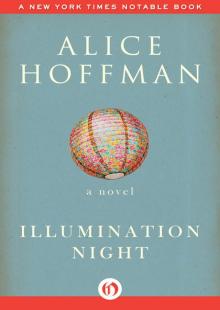 Illumination Night: A Novel
Illumination Night: A Novel The Marriage of Opposites
The Marriage of Opposites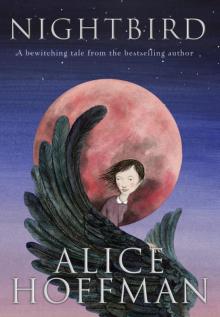 Nightbird
Nightbird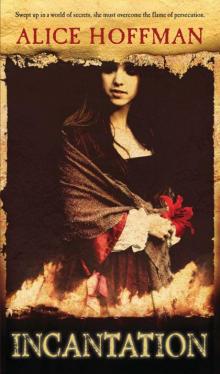 Incantation
Incantation Skylight Confessions
Skylight Confessions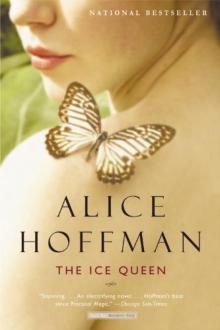 The Ice Queen
The Ice Queen Second Nature
Second Nature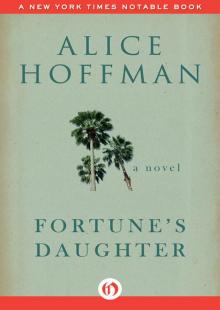 Fortune's Daughter: A Novel
Fortune's Daughter: A Novel Seventh Heaven
Seventh Heaven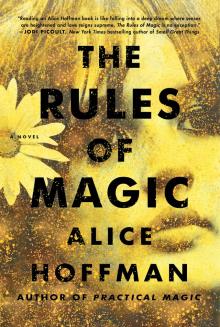 The Rules of Magic
The Rules of Magic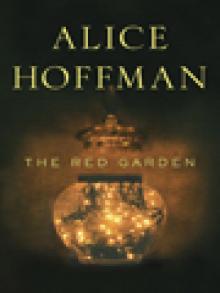 The Red Garden
The Red Garden The Third Angel
The Third Angel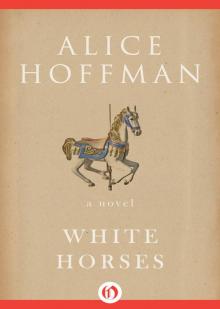 White Horses
White Horses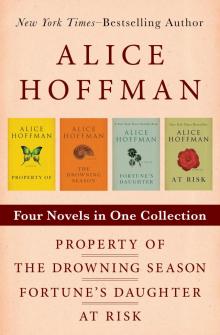 Property of / the Drowning Season / Fortune's Daughter / at Risk
Property of / the Drowning Season / Fortune's Daughter / at Risk Angel Landing
Angel Landing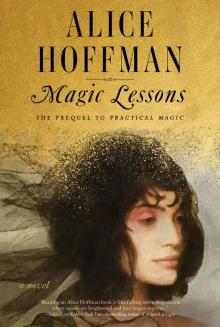 Magic Lessons
Magic Lessons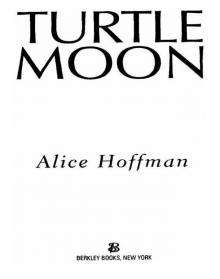 Turtle Moon
Turtle Moon Aquamarine
Aquamarine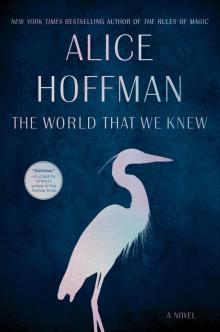 The World That We Knew
The World That We Knew Faithful
Faithful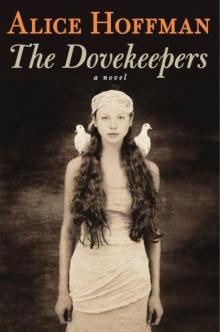 The Dovekeepers
The Dovekeepers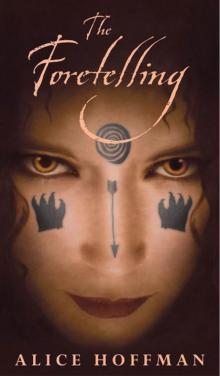 The Foretelling
The Foretelling Green Angel
Green Angel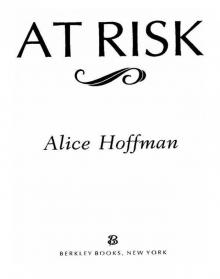 At Risk
At Risk Green Heart
Green Heart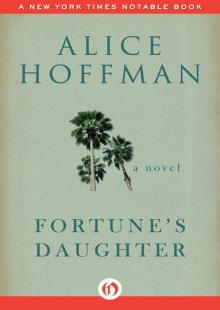 Fortune's Daughter
Fortune's Daughter Faerie Knitting
Faerie Knitting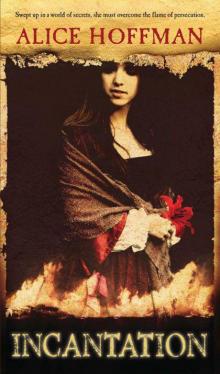 Incantation (v5)
Incantation (v5) Green Witch
Green Witch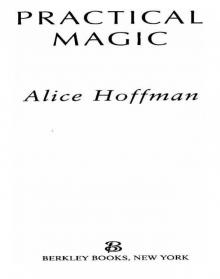 Practical Magic
Practical Magic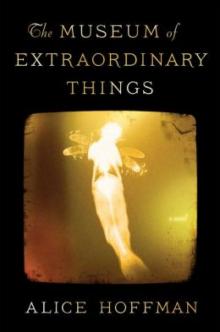 The Museum of Extraordinary Things
The Museum of Extraordinary Things The Probable Future
The Probable Future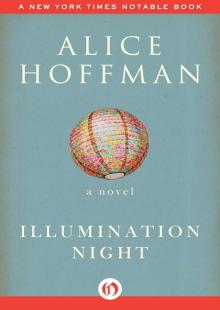 Illumination Night
Illumination Night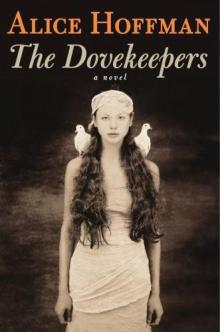 The Dovekeepers: A Novel
The Dovekeepers: A Novel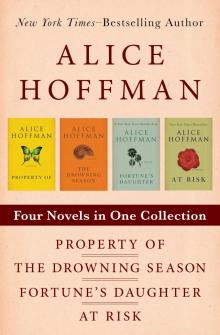 Property Of, the Drowning Season, Fortune's Daughter, and At Risk
Property Of, the Drowning Season, Fortune's Daughter, and At Risk